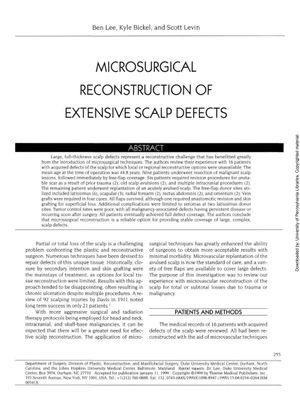Microsurgical Reconstruction of Extensive Scalp Defects
May 1999
in “
Journal of Reconstructive Microsurgery
”

TLDR Microsurgical reconstruction effectively covers complex scalp defects but doesn't improve survival for cancer-related cases.
Between 1993 and 1996, 16 patients with a mean age of 44.8 years underwent microsurgical reconstruction for extensive scalp defects due to malignancies, trauma, and other causes, using various free-flap donor sites. The immediate success rate for flap viability was 93.6%, achieving full defect coverage for all patients. However, those with defects from malignancies experienced high rates of persistent disease or recurrence. The document highlights the effectiveness of microsurgical techniques in providing stable coverage for complex scalp defects, with the latissimus, rectus abdominis, and omentum flaps being particularly useful, despite not offering hair restoration. The use of vein grafts, arteriovenous shunting, and pre-expansion techniques are also discussed. The authors conclude that while free-flap reconstruction significantly improves quality of life by providing durable coverage, it does not improve survival in cases of malignancy.




